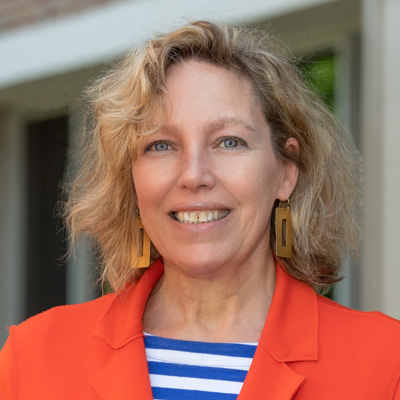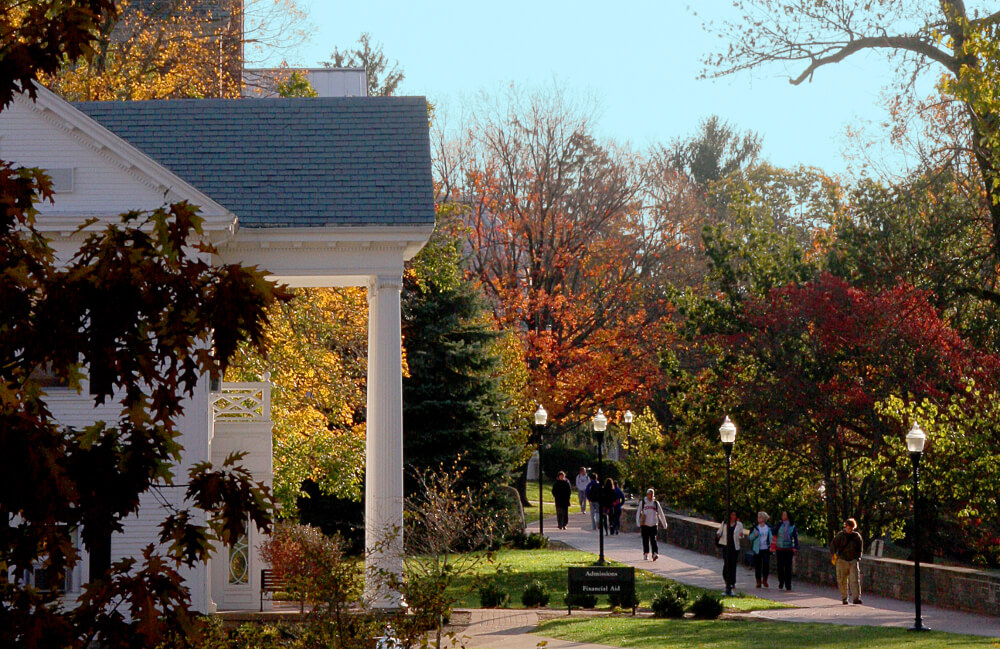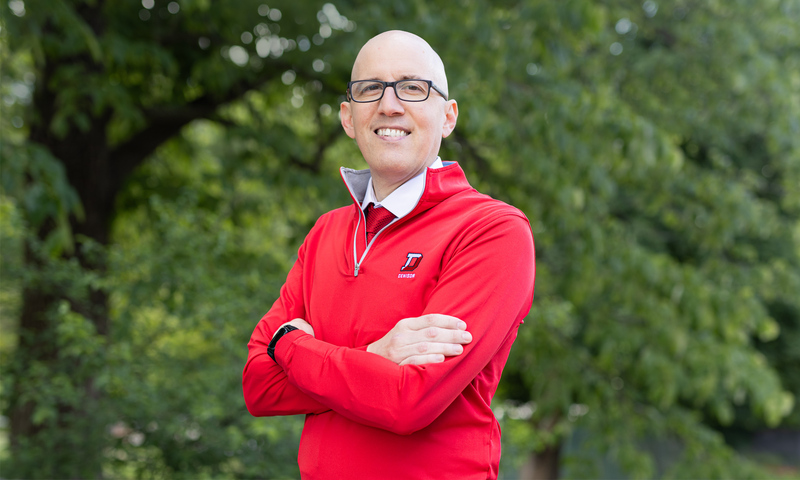Recently members of the Granville Area Chamber of Commerce gathered at Denison University for a monthly luncheon meeting. The Chamber was welcomed to campus by David English – Denison CFO and Vice President for Finance and Management – who shared some valuable insights into how the University is doing. He also spoke with pride about the caliber of Denison’s students and informed the audience about the many and significant ways that the University benefits and enriches our community.
Here are English’s remarks:
On behalf of all my colleagues, welcome to Denison University! Denison is very fortunate to be located in a town as attractive as Granville – this helps us recruit not only students, but employees who wish to call it home. Many of our peers are located in towns or neighborhood that don’t benefit them in the ways that Granville helps Denison.
But Denison’s relationship with Granville is more complex than a simple “we are here” postcard portrait. Denison, I think, is also a key contributor to Granville’s health and vitality.
To start, Denison brings a qualitative component to Granville: lectures, concerts, sporting events, community outreach activities, and the presence of an attractive, green campus right in town. It’s difficult to enumerate the impact of these events, but they contribute to the vibrancy and health of our community.
I realize this is, after all, a Chamber of Commerce meeting, so let’s turn to some more quantifiable benefits stemming from Denison’s presence in the community: the economic impacts of Denison as an entity, Denison’s employees, students and visitors.
Denison is a significant purchaser from local businesses – in calendar year 2015, Denison directly purchased over $11 million of goods and services from Licking County businesses.
Denison is also a sizable employer in Granville. We have nearly 300 employees who live in the local zip code. That results in something like $10 million to $13 million in salaries paid to local community members. Some of that, in turn, is recycled and paid to local businesses.
Then our students. We have roughly 2,200 students on campus. Naturally they routinely walk into town to spend money. Estimates vary on the amount students spend annually in the local community but the range is between $1,100 and $5,000. Even at the lower end, say at $2,000 per student, that’s almost $4.5 million that students contribute to the local community. Some for food, convenience items, and desserts at places like Alfie’s, CVS and Whit’s, as well as other places.
Finally, there are visitors to our campus. You may have noticed a few people visited town last weekend for a small event we held called graduation. The Admission Office estimates that 5,000 people visit Denison annually related to prospective student events. Alumni Affairs, estimates that 1,500 people visit related to alumni events.
Additionally, we have college guests – lectures, conferences, summer events - and sporting events that draw people to our town. Since nearly all of our prospective and matriculated students come from outside Granville, their spending, either directly themselves or indirectly through Denison purchases or payroll, is not just net zero within our community, but adds fuel for our local economy.
So if these are some of the benefits Denison brings to Granville, you might reasonably ask: is Denison doing well enough to keep doing that? The answer, in short, is yes.
How are we doing in attracting students? Denison continues to enjoy robust enrollment of exceptionally talented students. Last year, we had our second-highest number of applications, eclipsed only by this year. In Fall 2014 we had 4,898 applications, Fall 2015 was 6,110, and for Fall 2016 we had 6,881. Fall 2016 was up 13% from the previous record and up 40% from just two years ago. We admitted slightly fewer students, but because of a slight increase in our yield rate, the number of admitted students who accept and enroll – we expect the class entering in the Fall of 2016 to be slightly larger than the class of Fall 2015.
And let me note that our students are outstanding. We’re not attracting more students by accepting less qualified students. Denison students have finished at or near the top of their high schools classes. The average high school GPA increased to 3.57 from 3.55, ACT composite scores went from 28.0 to 28.4, SAT critical reading went from 622 to 624, and SAT math went from 627 to 640.
Also, they’re incredibly diverse: they come from every region of the United States - 80% are from outside Ohio - and many countries around the world. One out of every three Denison students is from a multicultural background. One out of every five is the first one in his or her family to go to college. Our students are split almost equally among urban, suburban and rural backgrounds.
All of this means we have a wide range of life experiences, political and religious views, and intellectual perspectives on campus. This means they’re well prepared to flourish in a complex and sophisticated world, and deal with people who have experiences and views that differ from their own.
How do our students do after they leave Denison – which is really how are we doing at educating them? There also has been a great deal of media attention on employment and the value of a college degree.
The Denison story challenges most of what you read in the press. We recently completed our first survey of Denison alumni five years after graduation. In those first five years, 96 percent of our alumni have on-boarded into a profession of their choice, and 95 percent reported that Denison prepared them well. They are succeeding across a wide range of professions and geographic areas.
Why are Denison alumni doing so well? I would encourage everyone to read the recent research done by The Gallup Organization on college success. Gallup identifies six factors that determine how much students get from college. The factors relate to faculty mentorship, engagement in project-based learning, and being involved on campus. Denison is a benchmark campus for getting these factors right. For example, 89 percent of our alumni report having a close relationship with a faculty member and 75 percent of them held a leadership position as students at Denison.
Can families continue to afford Denison? There have been many reports about college affordability and accessibility, and this is one of my key concerns. You can’t survive if no one can afford to pay for what you offer. With roughly an $800 million endowment, we offer financial aid to 98% of our students.
Columbus Monthly reported that the average Denison student graduates with less debt than the average Ohio State student. The average Denison student has paid slightly less than $20,000 in tuition this year and will graduate with less than $25,000 in debt after four years here. Given what they learn and the strength of our alumni network, this is a great investment.
Lastly, how will we stay relevant for the future?
First, we are working to deepen student learning. This work starts in the classroom and continues with structured academic support. This year, we have most of our first-year students in Advising Circles that meet once a week during the fall to help students transition into college. One of the many things we do well at Denison is mentorship and this initiative builds on this strength.
Second, we are launching several new majors: Data Analytics, Global Commerce, and Health, Exercise and Sports Studies, and concentrations in Financial Economics and Journalism. These new programs tend to be interdisciplinary, using the liberal arts to explore where professions are headed. They are deeply exciting and demonstrate that Denison will help shape and define where the liberal arts are going.
Let’s take Global Commerce: Denison spent 18 months talking to alumni and employers, asking them how they would prepare students to be successful in the emerging economy. Overwhelmingly, they said we should give students a core of courses on accounting, economics, and basic exposure to the concepts of business while immersing them deeply in a wide range of liberal arts disciplines that allow students to understand history, culture, politics, language, and ethics. And they said to make sure students have a robust set of experiences through study abroad, research projects, and internships. Denison’s new major in Global Commerce is exactly this kind of academic program.
Third, we are focusing heavily on the arts. As part of this, we will be building a new performing arts center on the Fine Arts Quad along West College Street. We want to position Denison as the liberal arts college for arts-oriented students who do not want a conservatory environment. In addition to being a game-changer for Denison, it has the potential to be great for the local community. This center will support our very strong music, theater, and dance departments.
Fourth, we are reinforcing the value of campus life and capturing the learning that takes place outside of the classroom as 2,000 talented students from divergent backgrounds live together on a fully residential campus. We are focused on diversity, helping our students learn how to live and work with people who are different from themselves. We also want Denisonians to understand that the best decisions are made by diverse teams of people.


